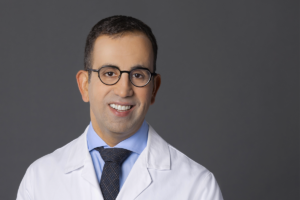Dr. Elad Anter is a world-renowned Cardiac Electrophysiologist. He earned his undergraduate and medical degrees from the Hebrew University in Jerusalem before relocating to the United States to pursue a postdoctoral research fellowship in Molecular Biology at Boston University.
He remained in Boston to complete his Internal Medicine residency at the Brigham and Women’s Hospital, Harvard Medical School. He continued his training as a fellow in Cardiovascular Medicine followed by Cardiac Electrophysiology at the University of Pennsylvania in Philadelphia.
In 2011, Dr. Anter was recruited to Beth Israel Deaconess Medical Center, Harvard Medical School in Boston by the late Dr. Mark E. Josephson, a pioneer in the field of Cardiac Electrophysiology. Drs. Anter and Josephson worked closely together and have made significant contributions to the field of Cardiac Electrophysiology, particularly in the area of ventricular tachycardia mapping and ablation. Dr. Anter was then promoted to an Associate Professor of Medicine and assumed directorship of the Cardiac Electrophysiology Laboratories at Beth Israel Deaconess Medical Center. In 2020, Dr. Anter was recruited to the Cleveland Clinic as a Professor of Medicine and an Endowed Chair of Cardiovascular Medicine. Dr. Anter and his research team have continued to innovate and publish in the field of Cardiac
Electrophysiology.
- Why did you choose to become a cardiologist specializing in rhythm abnormalities?
Biology, physiology, and physics have always fascinated me, and although I majored in these subjects in high school, it was not always clear to me that I wanted to become a physician. It was not before my father developed severe heart disease during his mid-40s that I made my mind to study medicine. I felt a strong desire to become a patient advocate and provide compassionate care while researching and exploring possibilities to find new solutions and advance medical care. The choice of Cardiac Electrophysiology was natural, as rhythm abnormalities are a major cause of sudden cardiac death and I have always had interest in electrical engineering which is closely related to electrophysiology.
- As a native Israeli, has it been challenging to develop your career in the United States?
I moved to the United States nearly twenty years ago, and have completed all my medical training in leading academic centers. Throughout my career, I was fortunate to have outstanding mentors. I owe my passion for science, rigorous systematic scientific thinking, and experimental design to my first mentor, Dr. John F. Keaney. In his laboratory, I completed a two and a half years Research Fellowship in Molecular Biology. I was then fortunate enough to do Residency Training in Internal Medicine at the Brigham and Women’s Hospital, one of the top programs in the country with many brilliant minds that have since become close colleagues and friends. However, it was only at the University of Pennsylvania that I was enlightened in cardiac electrophysiology due to the exceptional faculty and program. My journey continued with the late Dr. Mark Josephson. He seeded so many ideas and motivated me to tackle difficult problems in cardiac electrophysiology in an effort to foster a better understanding of complex diseases and to develop new therapeutic options.
I was very lucky to have developed my career in the United States and am a proud citizen. That said, it has been difficult to be so many years away from my aging parents, siblings, and friends in Israel.
- Is there any specific area within cardiac electrophysiology that you focus on?
I specialize in catheter ablation of arrhythmias, particularly of atrial fibrillation and ventricular tachycardias in patients with structurally normal hearts and those with scar-mediated arrhythmias. My practice often includes patients with difficult arrhythmias, particularly those who had failed previous ablation procedures. I have gained significant experience with those types of patients and utilize knowledge, new technologies and methods, some that were developed in my laboratory.
- Can you tell us about recent innovations in your research laboratory that can help you with the treatment of patients?
My research laboratory is a vibrant space of excitement, education, and innovation. The research team includes physicians doing their post-doctorate training, electrical and medical engineers, veterinarians, and technicians. The questions we try to answer stem from our clinical expertise in caring for patients with these difficult to treat arrhythmias. Therefore, our research focuses on the study of arrhythmia mechanisms using physiologically relevant animal models. We are particularly interested in atrial fibrillation and ventricular arrhythmias, and with that in mind, we dig deep into understanding the physiology so we can build the best possible therapies. We have had significant contributions to catheter development, high-resolution mapping, and innovation in ablation methods and technologies. The most recent innovation in my laboratory includes a new ablation energy called ‘pulsed-field ablation’ that offers a faster, safer, and more effective treatment for patients with atrial fibrillation and potentially for patients with ventricular arrhythmias. My laboratory has been involved in the initial preclinical studies in animals, the first use in human patients and in pivotal studies.
- What has been the most rewarding aspect of your career so far?
This is simple: the positive impact we often make on our patient’s lives. Arrhythmias can be very bothersome, particularly for patients with ventricular arrhythmias who receive shocks from their implantable defibrillators. Many of these patients develop trauma from repeated shocks and have failed therapy with multiple different medications. I see every one of these patients as he or she were a family member, and do everything possible to help them resolve this problem and return to a life without arrhythmias and further traumas. I also enjoy training the next generation of cardiologists and electrophysiologists. Mentors have a critical role in helping mentees ask proper questions and find useful answers, and I feel gratitude when I see my mentees succeed and develop their own career that is based on compassionate care and highly developed skills.
- Do you have a role model?
I have had several role models throughout my life. Some were my teachers, some were my students, and some were outside the medicine field. Dr. Mark Josephson has had the most significant influence on my development as an adult and as an electrophysiologist. He taught me the importance of constant questioning of the status quo.
- How would your colleagues describe you?
I think my colleagues would describe me as an honest, inquisitive physician that tries to make a difference in treatment of patients, as a patient advocate that puts patient care above all, and probably not as a great politician.
- Do you have any advice for young physicians?
Always be the best doctor you can be and treat every patient like he or she is your own family. Find a mentor you respect, remain curious, debate the status quo, and strive to make meaningful contributions.
- How do you measure success?
The ability to make a positive impact on my patient’s life is what success as a physician is all about for me. Success as a researcher is the ability to make meaningful contributions to science that others can reproduce and that lead to better therapies. Success as a father and husband is not to merely be available when needed or during vacations, but to be present every day, and to take an active part in their well-being.
- What are your favorite things outside of work?
Besides spending time with my wife and kids, I love music, particularly classical music. I find that it allows me to have authentic communication with my emotions, it inspires my creativity, and it helps me maintain my well-being. I spend some time every day listening to a particular piece, recording, or a new interpretation. In particular, I feel connected with Gustav Mahler’s personality and music.























0 Comments